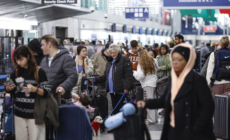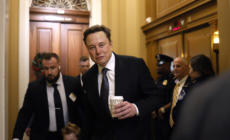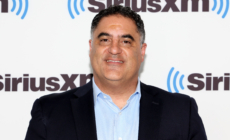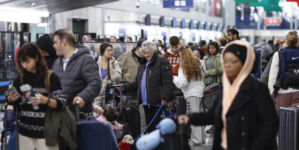-
Possible rain, high surf forecast for Los Angeles area in holiday week - 25 mins ago
-
Tiger Woods Son Charlie Hits Epic Hole in One While Playing Alongside Father - 38 mins ago
-
Trump Picks a Former Treasury Official as His Top Economist - 44 mins ago
-
Winter Weather: ‘Trouble Spots’ Across US as Millions Travel for Christmas - about 1 hour ago
-
Woman Dies After Being Set on Fire in Subway Car, Police Say - about 1 hour ago
-
Republican Says Elon Musk Feels Like ‘Our Prime Minister’ - 2 hours ago
-
What Kennedy’s Approach to Addiction Gets Wrong - 2 hours ago
-
Titans Make Decision on Starting Quarterback For Week 16 - 2 hours ago
-
Germany Searches for Motives in Christmas Market Attack - 3 hours ago
-
Dodgers Reportedly Pursuing Blockbuster Trade For Cubs’ Seiya Suzuki - 3 hours ago
Walz and Vance Delivered the Debate Americans Wish Their Running Mates Had
It was a long way from claims of “they’re eating the cats, they’re eating the dogs.”
Minutes into Tuesday night’s vice-presidential debate, Ohio Senator JD Vance and Minnesota Governor Tim Walz set aside the vicious and nasty attack rhetoric that has defined this election cycle for a calm, policy-driven exchange of ideas.
Both candidates dug into their stances with the kind of detail voters had been waiting months to hear from the candidates at the top of the ticket.

Photo by ANGELA WEISS / AFP) (Photo by ANGELA WEISS/AFP via Getty Images
As the debate unfolded, it became clear the showdown would be different from the two other debates of this season, and a departure from the fiery and often harsh personal attacks that have become the stock-and-trade of Donald Trump’s debate strategy. Walz and Vance focused on everything from the nuances of manufacturing policy to gun violence, even finding moments of agreement on more than one occasion. Still, their competing visions for the country’s future stood in sharp contrast — which is, after all, the point of a debate.
This shift in tone was notable, especially considering the combative and downright bizarre nature of the two previous debates between the candidates at the top of the ticket. The two Midwesterners, separated by a generation, struck a more measured note compared to the fiery face-off between Trump and Vice President Kamala Harris — to say nothing of Trump’s earlier clash with President Joe Biden that ended his half-century political career.
Detour Into Substance
Iran’s ballistic missile attack on Israel earlier in the day set the tone for the evening, highlighting the perilous geopolitical moment as well as the contrast between Republican and Democratic foreign policy positions. The debate kicked off with Walz being asked if he’d support a preemptive strike by Israel against Iran. Walz, who looked nervous at the beginning before settling into a rhythm, praised Harris’ foreign policy leadership but never answered that question.
Vance countered by portraying Trump as an intimidating figure whose mere presence on the global stage serves as a deterrent. “Gov. Walz can criticize Donald Trump’s tweets, but effective diplomacy and peace through strength are how you bring stability to a very broken world,” he said.

Anna Moneymaker
In an era of statements crafted to go viral on social media, Tuesday’s debate took an immediate detour into substance, even wonkishness. Both Vance and Walz, chosen for their communication skills, spent more time discussing policy than either presidential candidates did in their debates.
When the devastation of Hurricane Helene came up, Vance answered a question about climate change by pivoting to jobs and manufacturing. Avoiding Trump’s past claim that climate change is a “hoax,” Vance argued that bringing more manufacturing to the U.S. would help address the climate crisis and position America as a leader in clean energy.
Walz, meanwhile, focused on the Biden administration’s investments in renewable energy alongside record levels of oil and gas production. “We’re positioning ourselves to become an energy superpower,” he said, offering a more optimistic outlook on an issue rife for pessimism.
Immigration Sparks Rare Heated Exchange
To be sure, the debate, hosted by CBS News at its studios in Manhattan, was not exactly a lovefest. The tone quickly escalated when immigration came up, and again at the end in a back-and-forth over Jan. 6. On immigration, both Walz and Vance launched sharper attacks, leading to a moment when the moderators had to cut their microphones to put an end to the heated exchange. It was the first and only time their mics would be cut.
While both Vance and Walz agreed that the number of migrants in the U.S. illegally is a problem, each blamed the opposing presidential nominee.
Vance echoed Trump, repeatedly referring to Harris as the “border czar,” and suggested that she single-handedly rolled back the immigration restrictions Trump had imposed. In Vance’s view, this led to an unchecked flow of fentanyl, a strain on state and local resources, and rising housing prices across the country.
Walz countered by advancing Democrats’ argument that Trump derailed a bipartisan Senate deal to tighten border security and improve the immigration processing system. He noted that Congressional Republicans backed out of the deal only after Trump directed them to kill it, lest they deprive him of a campaign issue.
Even on the hot-button issue of abortion, the debate stayed relatively cordial and policy focused.
At one point, Vance said that he never supported a national abortion ban during his 2022 Senate campaign (he did, in fact). Instead, he explained that he advocated for a “minimum national standard.” Walz offered little pushback, allowing Vance to present his views with minimal challenge.
In one of the more raw moments of the night, when asked about guns and defending the Second Amendment, Walz shared — apparently for the first time — that his teenage son had witnessed a shooting at a community center. Vance responded:
“Tim, first of all, I didn’t know that your 17-year-old witnessed a shooting, and I’m sorry about that and I hope he’s doing OK. Christ have mercy, it is awful.”
Walz responded, “I appreciate that.”
Vance was addressing a question about whether prosecutors should charge parents for mass shootings committed by their children, but he quickly shifted the focus to preventing school shootings in general. In his view, the key to prevention is increasing school security.
Walz, on the other hand, quickly pivoted to gun control. “I think what we end up doing is looking for a scapegoat. Sometimes it really is the guns,” he said, noting that as governor of Minnesota, he had signed gun control laws, including a red-flag law and legislation strengthening penalties for providing guns to those who are prohibited from possessing them.
By the end of the debate, Vance and Walz engaged in a heated exchange about the Jan. 6, 2021 Capitol riot, with Walz directly asking his opponent if he would acknowledge that Joe Biden won the 2020 election, a question Vance did not answer.
Vance downplayed Trump’s actions during the event, asserting that Trump had instructed people to “peacefully” march on the Capitol. He further argued that the real threat to democracy was social media censorship, a point some pundits considered his weakest moment in an otherwise strong performance.
The debate ran longer than the allotted 90 minutes, but there were still some key topics left unaddressed by the moderators and the candidates. Vance was not asked about Ukraine, although he’s among the Republican Party’s leading opponents of U.S. aid to the besieged country.
No one mentioned about Trump’s criminal cases, including his conviction in a New York case related to hush money payments. Vance’s infamous “childless cat ladies” comments did not come up, and his more incendiary remarks about Haitian migrants killing and eating pets in rural Ohio made but the briefest of appearances, drowned out by a larger back-and-forth over the nuances of asylum and immigration law.
It was only then that the moderators exercised their right to cut their mics, if only to move on to another topic.
Source link






















